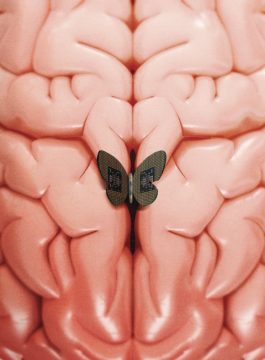Zachary Siegel in Harper’s:
 On a bright summer day in July 2021, James Fisher rested nervously, with a newly shaved head, in a hospital bed surrounded by blinding white lights and surgeons shuffling about in blue scrubs. He was being prepped for an experimental brain surgery at West Virginia University’s Rockefeller Neuroscience Institute, a hulking research facility that overlooks the rolling peaks and cliffs of coal country around Morgantown. The hours-long procedure required impeccable precision, “down to the millimeter,” Fisher’s neurosurgeon, Ali Rezai, told me.
On a bright summer day in July 2021, James Fisher rested nervously, with a newly shaved head, in a hospital bed surrounded by blinding white lights and surgeons shuffling about in blue scrubs. He was being prepped for an experimental brain surgery at West Virginia University’s Rockefeller Neuroscience Institute, a hulking research facility that overlooks the rolling peaks and cliffs of coal country around Morgantown. The hours-long procedure required impeccable precision, “down to the millimeter,” Fisher’s neurosurgeon, Ali Rezai, told me.
Prior to operating, Rezai and his team of neuroscientists created a digital rendering of Fisher’s brain, a neural map that would help them place what looked like a pair of long metal chopsticks roughly six centimeters deep into his nucleus accumbens, a structure in the center of the brain. The nucleus accumbens, according to the latest research, is associated with processing reinforcement, motivation, and desire. It’s also where the most famous neurotransmitter, dopamine, gets released when we anticipate rewards from behaviors like sex, drug use, or gambling. Rezai, who thinks as much like a neural engineer as like a surgeon, described the nucleus accumbens as the brain’s Grand Central Station, a junction for “addictions and anxiety and obsessions.”
More here.
